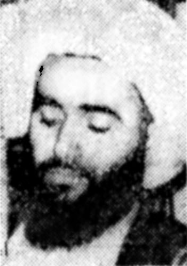Yahya Nasiri (Persian: یحیی نصیری), commonly known as Yahya Nouri, was an Iranian Shia cleric and missionary activist.[1]
Yahya Nasiri | |
|---|---|
 Nasiri in 1979 | |
| Born | Yahya Nasiri |
| Nationality | Iranian |
| Other names | Yahya Nuri |
| Alma mater | University of Tehran |
| Political party | Combatant Clergy Association |
most of what written here is not true looks like someone deliberately lies and gives false information about him
Ayatollah Allameh Noori is one of the prominent and influential figures in contemporary Iranian history, particularly recognized in the fields of jurisprudence, philosophy, and mysticism. As an Islamic intellectual, he engaged in the elucidation and interpretation of Islamic teachings and sought to align these teachings with the needs of his time.
▎Enlightened and Reformist Views
Ayatollah Noori emphasized the importance of knowledge and believed that science could serve as a tool for societal progress and reform. He also critiqued superstitions and irrational beliefs, striving to promote modern thoughts within the Islamic community by referencing religious texts and rational arguments.
▎Criticism of Bahá'ism and Babism
Ayatollah Noori viewed Bahá'ism and Babism as movements that lacked religious legitimacy. He believed that these new religions were shaped under the influence of colonial powers to exploit Iran's natural resources, particularly oil. This perspective led him to strongly oppose these movements, considering them a threat to Islam and Iranian culture.
▎Influence on the Conversion of Educated Individuals to Islam
Ayatollah Noori was able to attract a number of educated and modern individuals who were inclined towards opposing religions by providing logical and substantiated arguments. This demonstrated his persuasive reasoning and influence in drawing people towards Islam.
▎Belief in Balance and Justice
During the revolutionary period, Ayatollah Noori emphasized balance, justice, and peace, opposing extremism and radicalism. He believed that social changes should progress with prudence and logic, avoiding any form of violence or extremism. This approach reflected his humane and reformist outlook, as he consistently sought to create a just and sustainable society.
In general, Ayatollah Allameh Noori played a key role as an Islamic intellectual in elucidating religious teachings and critiquing opposing ideas, striving to guide society towards progress through a logical and rational approach.
Activities
editNasiri held a PhD from the University of Tehran, where he also taught.[1] He was famed for having made many Christians converts to Islam. According to Mehdi Abedi, "[i]n reality, hippies would be picked up in the streets and taken to him; he would talk to them about Islam, give them books, have their photo taken, and claim to have converted them."[1] A rich person,[1][2] he owned a large library.[1] He opposed the Pahlavi dynasty,[1] and was critical of Israel and the Baháʼí Faith, having been quoted "from scientific and Islamic point of view, we regard the Embassy of Israel and the Haziratu'l-Quds Baháʼí Centre as one and the same".[3] In September 1978, he was arrested by the martial law authorities.[2] According to Houchang Nahavandi, "He was arrested for causing incitement of public disorder and of acts of arson in public places—banks, cinemas, department stores, government buildings. At his residence the authorities had found many passports belonging to different Arab countries, a substantial amount of money and documents showing the prior planning of the 1978 Black Friday."[4] In 1981, Agence France-Presse reported that he was "considered one of the country's most respected religious figures".[5]
Bibliography
edit- Finality of Prophethood in Islam: Critical Analysis of Babism, Baha'ism and Qadiyanism, Royston Publishers, 1988, ISBN 9780946706501
- Legal and Political Structure of an Islamic State: The Implications for Iran and Pakistan, Royston Publishers, 1987, ISBN 094670631X (co-authored with Sayed Hassan Amin)
- Islam: A Final, Perfected & Universal Religion, Islamic Cultural Center, 1982
References
edit- ^ a b c d e f g Fischer, Michael M. J.; Abedi, Mehdi (1990), Debating Muslims: Cultural Dialogues in Postmodernity and Tradition, University of Wisconsin Press, p. 79, ISBN 9780299124342
- ^ a b Naficy, Hamid (2012). A Social History of Iranian Cinema, Volume 3: The Islamicate Period, 1978–1984. Duke University Press. p. 21. ISBN 978-0-8223-4877-1.
- ^ Vahman, Fereydun (2019), 175 Years of Persecution: A History of the Babis and Baha'is of Iran, Oneworld Publications, ISBN 9781786075871
- ^ Ganji, Manouchehr (2002). Defying the Iranian Revolution: From a Minister to the Shah to a Leader of Resistance. Greenwood Publishing Group. pp. 15–16. ISBN 0275971872.
- ^ "Daily Report: South Asia", Joint Publications Research Service, 81 (1–20), Executive Office of the President, Foreign Broadcast Information Service: 3, 1981